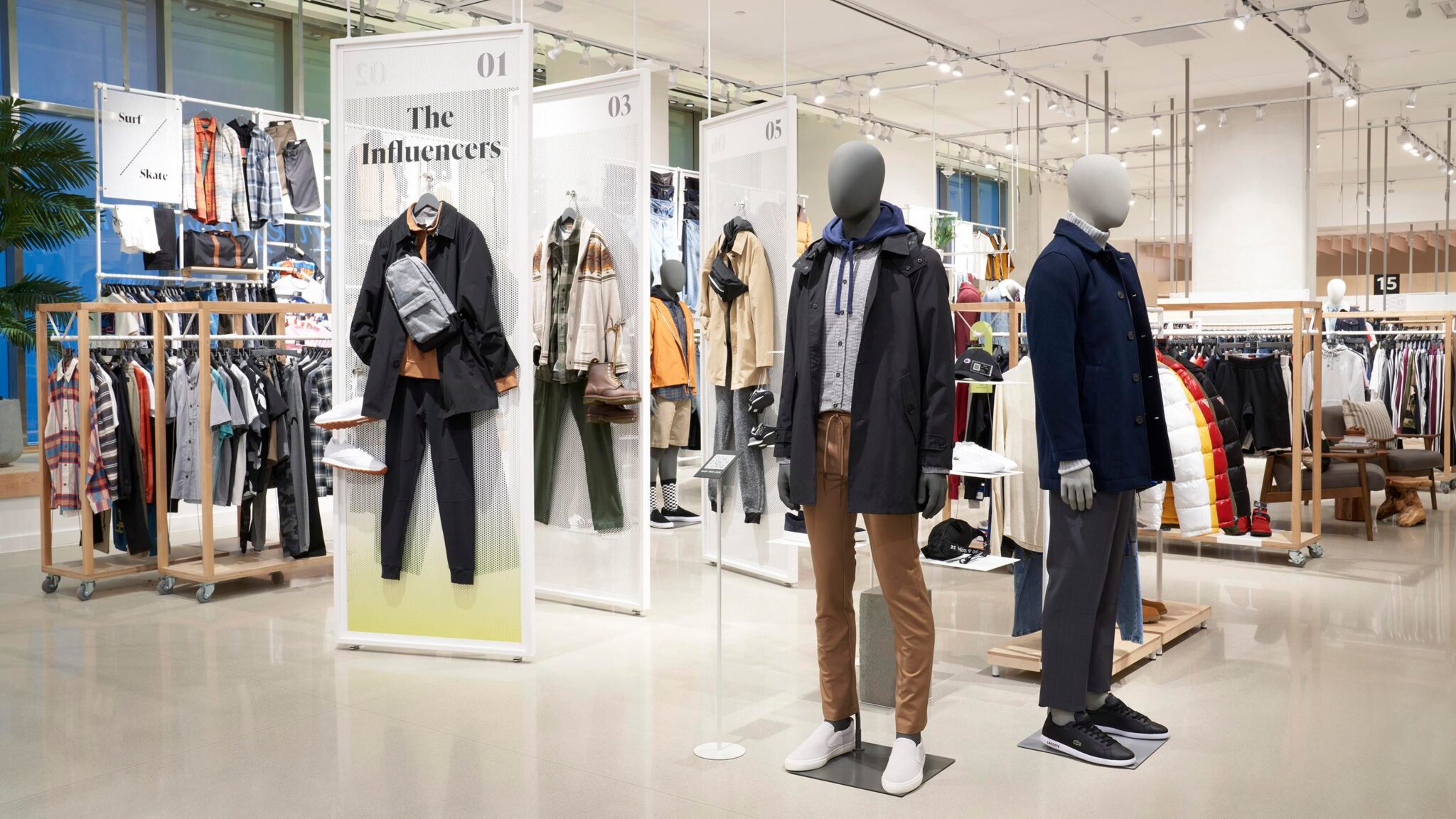
View of display-only merchandising at Amazon Style, Amazon’s new apparel store concept. … [+]
At first glance, Amazon’s latest foray into the physical world of apparel retailing, recently dubbed, Amazon Style, looks like it will be quite the odd consumer experience.
But looks can be deceiving, especially depending on one’s time horizon.
As seen in the below video and according to a recent press release, here’s an at-first glance summary of how the store works:
- All items showcased on the store’s salesfloor are for “display” only.
- When shoppers see something that they like, they can take out their Amazon Shopping apps, scan a QR code associated with a given product on display and then “see sizes, colors, overall customer ratings, and additional product details” for that item.
- From there, they can elect in the app to have items sent either to a pickup counter for checkout or to a fitting room to try them on.
- Once shoppers arrive in the fitting room, the items they selected magically appear inside the fitting room’s closet and a digital mirror, personalized with their names on it, knows what items they have selected, and shoppers can elect to have new items brought to them without ever leaving the fitting room or speaking with another human being ever again.
- And, finally, when all product selections are made, the shoppers can walk up to a counter to checkout or, one would surmise, can also elect to have all the products shipped directly to their homes instead.
If the whole thing sounds a little weird, that’s because it is.
No floor stock alone should be enough to give anyone pause, if that were all that was really going on, but the whole experience just described is, in all actuality, a carbon copy retread of a ménage à trois mash up of three ideas already put into market many years ago.
MORE FOR YOU
The experience is one part Hointer (circa 2012), one part Rebecca Minkoff’s Magic Mirror (circa 2014), and one part Amazon’s own GH Lab experiment at the Mall of America (circa 2018).
Or, said another way, it really isn’t all that new.
At all.
So why do it?
Because there is likely something much bigger at play for Amazon.
The first Amazon Style store, set to debut in Los Angeles sometime later this year, is likely nothing more than an experiment. It, therefore, should be put in the same camp as Amazon’s Books, which is also a weird as hell physical retail experience for Amazon, until you realize that Books was actually the precursor to Amazon Go, in that it was the first place that Amazon piloted the computer vision technology that it now uses to power Amazon Go’s “Just Walk Out” experience.
Everything Amazon does is an experiment.
In fact, Amazon Style is just the next iteration of the very same experiment that it started with GH Lab. The only difference is that Amazon Style sells apparel vs. home goods and also comes with a magical fitting room experience. All else is almost exactly the same (for a video demonstration of how GH Lab worked, see below).
All of which begs the question: What else could be going on here?
The smart money is on Amazon Style being the first step on the way to an eventual “Just Walk Out” Amazon Go-like apparel shopping experience.
Making “Just Walk Out” technology work for apparel is incredibly complicated. Not only does one need to accommodate the fitting room process into the overall experience design but getting the camera systems to identify the smalls from the mediums of the same red shirt correctly, time and time again, is also no easy feat, either.
By placing only display stock on the floor at this point and only needing to track inventory of items going into a fitting room or to a pickup counter, Amazon Style, with or without cameras, will give Amazon an early stage sense of the inventory tracking dynamics at play in a controlled environment before it takes any further steps to regale the world with “Just Walk Out” apparel shopping.
Thus, the moral of this story is that no one should ever take what Amazon does at face value.
While Amazon refused to comment on the above speculation surrounding the eventual incorporation of its “Just Walk Out” tech within Amazon Style, it should be noted that previous historical timelines indicate that, if the speculation is true, the whole idea could happen relatively soon.
For example, there were three years between Amazon Books (2015) and Amazon Go (2018) and then almost another four years between Amazon Go and the next iteration of that experiment, i.e. Amazon Fresh, which Amazon just announced this past December now comes in the form of an unparalleled 40,000 square foot “Just Walk Out” grocery experience (December 2021).
Amazon plays the long game, meaning that, if a similar timeline is in play again, Amazon Style will debut roughly 4 years after GH Lab and that something bigger and badder is likely due to set the apparel shopping world on fire in or around the year 2025.
And, sadly, most everyone in the apparel industry will spend the time between now and then poking fun and pooh-poohing Amazon Style for the odd way it operates today rather than get the punchline to the joke that they, themselves, could be the ones being duped.




